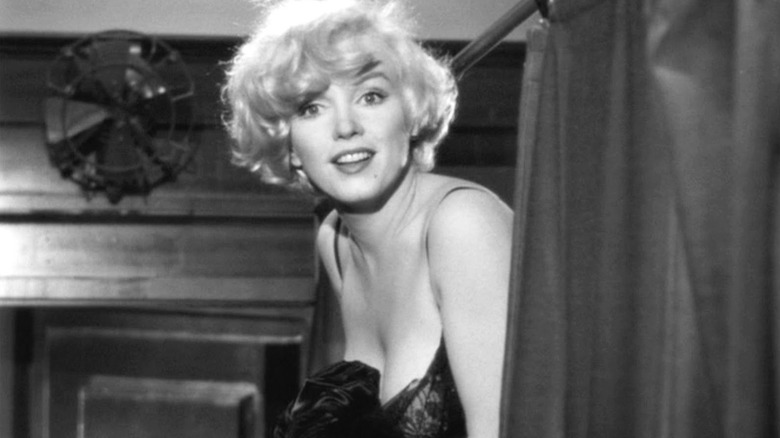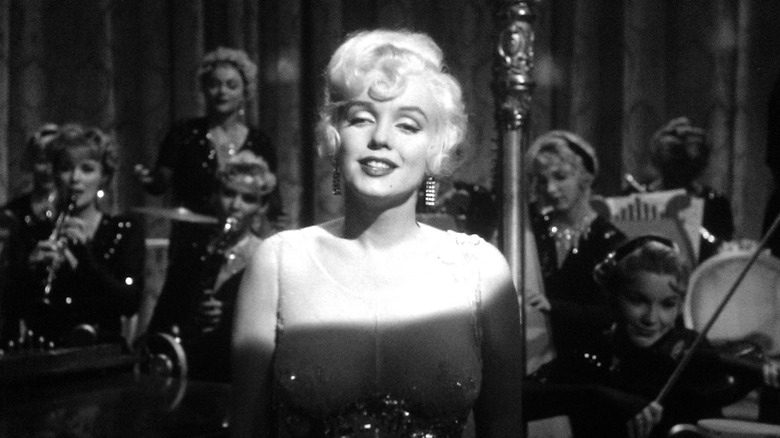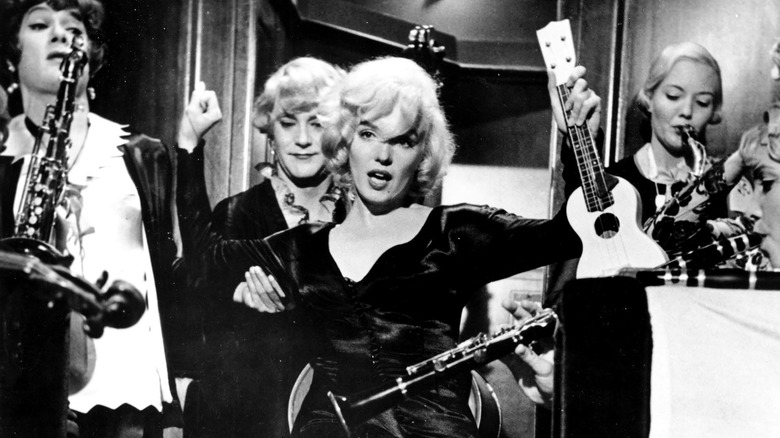Some Like It Hot Caused A Rift Between Billy Wilder And Marilyn Monroe
Billy Wilder's seminal cross-dressing comedy "Some Like It Hot" plays differently today than it did in 1959. A modern audience may be able to more sharply identify the film's undercurrent of queerness, as when Jerry (Jack Lemmon) finds that he may be more comfortable as a woman and entertains the notion of marrying a man (Joe E. Brown). There is also a scene late in the film when Joe/Josephine (Tony Curtis), while still dressed as a woman, kisses Sugar (Marilyn Monroe) on stage in front of a whole audience, cementing an element of female queerness earlier hinted at in a booze-soaked homosocial slumber party. And the film's famous final line, which I shall not repeat here for the sake of propriety, functions as a coming out.
Modern audiences are also a lot more knowledgeable about the film's troubled production, and of the personal tragedies of Monroe. Better known now than in 1959 were the facts of Monroe's barbiturate addiction, her abuse at the hands of a husband, and her endometriosis. Wilder, Lemmon, and Curtis have all told stories about how difficult it was to work with Monroe on the set, and film legend has it that she repeatedly flubbed simple lines like "Where's that bourbon?" and "It's me, Sugar." Curtis and Lemmon lost patience with Monroe, to the point where they began making bets as to the number of takes Monroe required to nail her lines. Monroe was reportedly late to the set on the regular. A mid-film beach scene had so many complicated lines for Monroe that several days were added to the shooting schedule to account for expected flubs. Monroe, however, finished shooting that scene in 20 minutes.
Most galling to Wilder was Monroe's deference to her acting coach Paula Strasberg over him. According to producer Walter Mirisch in the book "Billy Wilder's Some Like It Hot," Monroe would more often take direction from Strasberg, making for a lot of miscommunication and argument. Additionally, Monroe's husband at the time, playwright Arthur Miller, also tried to interject with story and character ideas, even though he was not a hired part of the production. Monroe's addiction-induced forgetfulness and the infiltration of her "handlers" left a sour taste in everyone's mouth, and no one walked away from "Some Like It Hot" without animosity.
I have no phallic symbol to lose
When production wrapped, Billy Wilder began slamming Monroe in the press (via Express), citing how difficult she was to work with, cruelly mocking her struggles to the point of questioning her humanity: "The question is whether Marilyn is a person at all or one of the greatest DuPont products ever invented." Wilder's wit is undercut by his unkindness. "She has breasts like granite; she defies gravity; and has a brain like Swiss cheese: full of holes." When asked if he would work with Monroe again, Wilder reportedly said, "I have discussed this with my doctor and my psychiatrist, and they tell me I'm too old and too rich to go through this again."
Monroe, meanwhile, was initially reluctant to take the role of Sugar Kane. Monroe had been pigeonholed in Hollywood, often asked to play stereotypical "dumb blonde" characters. There is a notorious story about her "The Prince and the Showgirl" co-star Laurence Olivier patronizingly telling her that all she needed to do was "be sexy." Monroe was sick of stereotypes and hated constantly being approached as if she was one. Sugar Kane certainly fits into the stereotype, but Monroe agreed to play the part because of a plum deal which added 10% of the film's profits to her salary. Although Monroe ultimately turned in a confident performance, Wilder likely didn't see that Monroe struggled with stage fright, perhaps requiring extra time to get herself into the proper mindset to shoot. When she did arrive on set, she and Wilder often butted heads as to the nature of the character. Wilder also had a reputation for being difficult, and the two of them together was a recipe for rage.
Monroe, like Wilder, lamented her negative experience working on "Some Like It Hot" in the press following the end of production. She called the whole film a sinking ship, and slyly took a dig at Wilder, Lemmon, and Curtis by saying, "Why should I worry? I have no phallic symbol to lose." On the set of "Showgirl," Monroe began to demand respect, and she would not arrive on set until she got it, a tactic suggested by Strasberg. It was a tactic she seemed to use often on "Some Like It Hot."
A comedy classic
"Some Like It Hot" was not only well-received in 1959, ultimately grossing $25 million and winning a Golden Globe for Best Comedy, for Best Actor for Jack Lemmon ... and for Best Actress for Marilyn Monroe. Wilder, at some point, came around on the completed film, saying that Monroe's performance was ultimately excellent. "Anyone can remember lines," Wilder said, "but it takes a real artist to come on the set and not know her lines and yet give the performance she did!" Now "Some Like It Hot" is often considered one of the best comedies of all time, having been cited by the AFI, the Sight & Sound poll, and the BBC as such.
After "Some Like It Hot," Marilyn continued to struggle with addiction. She was diagnosed with gallstones in 1960, and she lived in tremendous pain. She resented the constant stream of inferior "ditz" roles that were constantly offered to her and didn't appreciate that Miller often re-wrote scenes for her at the last minute, not giving her enough time to memorize a film's dialogue. It was during this time that she sang "Happy Birthday" to president Kennedy in an appearance that has become notorious for how suggestive it was. While Monroe was still under contract with Fox in 1962, the studio sued her for the delays she was causing on a film poetically titled "Something's Got to Give." Director George Cukor refused to complete the film without Monroe, so the studio sued him too, and the production was shut down. Monroe's final film would be "The Misfits" in 1961. "Something's Got to Give" was never finished, as Monroe died of a drug overdose in August of 1962. She was 36.
Wilder, Lemmon, and Monroe are all buried in the same cemetery in Westwood, CA.


